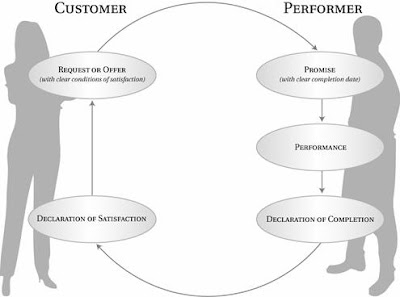One of the things I cover in my book, Managing Agile Projects is the topic of commitment based management. Fernando Flores’ language/action perspective stresses that most of the actual work in organizations happens through the making, keeping and coordination of individual commitments. People make commitments and deliver on them through performance or action.
On self-organizing agile teams, individuals are expected to make and keep the commitments necessary to manage their own activities. In his book, eXtreme Programming Explained, Kent Beck refers to this as accepted responsibility. Agile leaders should be therefore be looking at managing commitments, not activities.

With individuals on the team accepting responsibility for their own activities, a large part of an Agile Manager’s work involves engaging in conversations that create and coordinate team members’ commitments. There are three important types of conversations that enable action-oriented commitments: conversations for action (see picture), conversations for possibilities and conversations for disclosure. Read more details about this at Clarke Ching’s site: https://www.clarkeching.com/flores/index.html.
